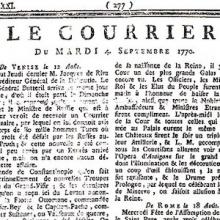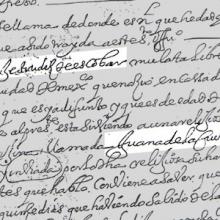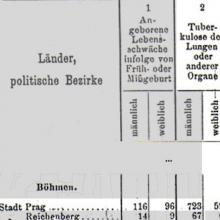Browse Primary Sources
Locate primary sources, including images, objects, media, and texts. Annotations by scholars contextualize sources.
Women’s Reflections on Motherhood and Reproduction under Socialism
During a set of oral history interviews conducted in Braşov, Romania, during the summer of 2003, “F” and “R” talk about rearing children under Socialism. For “F” it was a mixed-blessing, since she adored her infant son, yet had to do so under less than optimal conditions.
Women’s Reflections on Food Rationing in the 1980s
During a series of oral history interviews conducted in Braşov, Romania, during the summer of 2003, “S” and “M” discuss the various strategies they used to procure food and concoct meals for their families during the period of rationing in the 1980s.
Vacations under Socialism
In this oral history interview conducted in Braşov, Romania, during the summer of 2003, “E” discusses traveling under Socialism. She notes that, despite the fact that the country was led by an uneducated dictator, people—that is working people—always received a two week, state-subsidized vacation.
Women’s Attitudes Toward the Transition to Democracy
During a set of oral history interviews conducted in Braşov, Romania, in the summer of 2003, “C,” “E,” “O,” “M,” and “L” discuss how the transition to a democratic system and a market economy have impacted politics, the economy, and women’s professional and everyday lives.
Press Release Regarding the Berlin Wall Memorial at the Baker Institute (Rice University)
In 2000, 11 years after the fall of the Berlin Wall, Rice University installed a section of the former wall as a permanent part of the Baker Institute.
Declaration of Charter 77
In 1976, the Czech psychedelic rock band, the Plastic People of the Universe, were arrested and tried by the Czech Communist government. The government convicted the band for disturbing the peace, with the band members serving 8 to 18 month sentences.
Serbian Academy of Arts and Sciences (SANU) Memorandum, 1986
Dobrica Ćosić is a member of the Serbian Academy of Sciences and Arts, and is considered by many to be its most influential member. While Ćosić has been credited with writing the Memorandum of the Serbian Academy of Sciences and Arts, which appeared in unfinished fashion in the Serbian public in 1986, he in fact was not responsible for its writing.
Is Poland Lost?
These brief excerpts from a longer report by the environmental organization Greenpeace highlight the ecological collapse that was taking place all across Eastern Europe by the early 1980s. As extreme as the Polish case sounds, it was unfortunately typical rather than exceptional.
Price Increases in Eastern Europe with Special Regard to Hungary
One of the most significant differences between the functioning of the East European Communist economies and the mixed-market economies of the West was the way in which prices for goods and services were determined. In a mixed-market economy, prices are determined by a combination of government regulation (especially taxes) and consumer demand.
Discussion between Gorbachev and Mitterand about Romania, July 1989
The transcript of the Mitterrand – Gorbachev meeting of July 1989 illustrates the international awareness of the extensive control and repression of citizens in Ceauşescu’s Romania.
Transcript of the closed "trial" of Nicolae and Elena Ceausescu, December, 1989
Elena and Nicolae Ceausescu fled from Bucharest by helicopter on December 22, but the pilot soon landed, claiming that they would be fired upon. The couple then hijacked a car but they were recognized, chased and caught by local police in Tirgoviste.
The Timişoara Proclamation, March 1990
Written on March 11, 1990, the Timisoara Proclamation, was a 13-point document that called for continuing to build on the victory over the communist dictatorship achieved in December 16-20, 1989.
Minutes of the Meeting between Nicolae Ceausescu and Mikhail Gorbachev, December 1989
The seemingly cordial conversation between the Soviet and Romanian communist leaders less than two weeks before the troubles started in Timişoara provides evidence of the wide differences between them. Ceauşescu wields the formulas of orthodox socialism, while Gorbachev tries to point him toward modernization, change, flexibility, and listening to the wishes of the Romanian people.
Telegram from the Minister of Foreign Affairs to all Embassies, December 1989
As the confrontation in Timisoara continued, the Romanian government tried to stonewall in its diplomatic contacts, and thus control the flow of information, in the hope that the repression unleashed against protesters would succeed in pacifying the rebels and then the dictatorship could resume business as usual.
Birth and Death in Romania, October 1986
In the last years of the regime, Pavel Câmpeanu, a prominent sociologist and a lifelong leftist and former prison cellmate of Nicoale Ceauşescu during World War II managed to smuggle out this article, which was published in The New York Review of Books.
Grafitti from the Romanian Streets, December 1989-January 1990
In February 1990, the ethnographer Irina Nicolau and a few friends, printed 250 copies of Ne-a luat valul [On the Crest of the Wave], the first book published in Romania about the 1989 Revolution. Included were 141 pieces of graffiti from December 1989-January 1990.
Letter of the Six, March 1989
In March of 1989, six prominent members of the Romanian Communist Party sent Nicolae Ceauşescu an open letter which was also leaked to the international press. In it they explicitly disagreed with his policies and suggested a number of reforms.

Excerpt from Courrier of Avignon
This paper is from September 1770 and at that time France had two kinds of newspapers, those run by the state that were censored and also papers published beyond the borders of France that had licenses to get in but could that be they could be revoked at any time. With the foreign papers, then, there was a kind of negotiation. “If you don’t say this, we’ll let you in.

Renunciation case against Gertrudis de Escobar, Mexico, 1659
This document is the proceedings of an 1659 Inquisition case brought against a 14 year old girl. The girl, named Gertrudis de Escobar, was accused of the crime of renouncing God. Gertrudis de Escobar was the child of a black person and a white person, termed at that time a mulata. Renouncing God was a fairly common crime that blacks and mulattoes were accused of.

Census of 1910 tuberculosis data
Census data is one way for historians to better understand the lives of average people who otherwise might be largely invisible to scholars. This excerpt from the 1910 census conducted by the Hapsburg Monarchy. The census data was collected for most towns and cities throughout the Monarchy every few years from between 1880 and 1910.